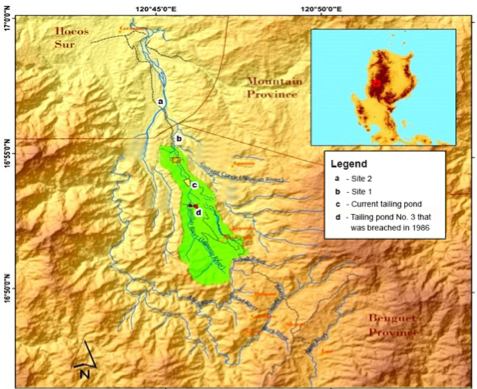VOLUME 12 NUMBER 1 (January to June 2019)

Philipp. Sci. Lett. 2019 12 (1) 031-038
available online: March 22, 2019
*Corresponding author
Email Address: drvccuevas@gmail.com
Date Received: February 03, 2018
Date Revised: January 19, 2019
Date Accepted: February 19, 2019
ARTICLE
Yield improvement with compost amendment and Trichoderma microbial inoculant (TMI) in rice paddies inundated by copper-rich mine tailings
by Virginia C. Cuevas*1, Cirilo A. Lagman, Jr.2,3, Xavier Anupo2, Joey I. Orajay2,4, and Frances G.E. Malamnao5
1Institute of Biological Sciences, College of Arts and Sciences
University of the Philippines Los Baños
2University of the Philippines Los Baños Foundation, Inc.
3Department of Soil Science, College of Agriculture, Benguet State University,
La Trinidad, Benguet
4Del Monte Philippines, Bukidnon
4University of the Philippines Los Baños Graduate School
University of the Philippines Los Baños
2University of the Philippines Los Baños Foundation, Inc.
3Department of Soil Science, College of Agriculture, Benguet State University,
La Trinidad, Benguet
4Del Monte Philippines, Bukidnon
4University of the Philippines Los Baños Graduate School
This research evaluated the improvements in the rice yield of paddies contaminated with copper-rich (Cu-rich) mine tailings that had been applied with rice straw compost and Trichoderma microbial inoculum (TMI). A field trial with three replicates was conducted in two sites to evaluate the effect of varying rates of compost application on rice yield. Treatments were: 0, 1, 2, 4 kg m-2 compost application. Dry weight of grains and number of productive tillers were monitored. Another study was conducted that served also as a field demonstration trial on using TMI alone and in combination with rice straw compost to improve yield in these Cu-contaminated rice paddies on the same sites for four seasons involving three pairs of paddy fields in each site. Two paddies compared were: TD0 (Technique Demonstrated) - TMI, 0 compost; TD1 – TMI + compost at 2 kg m-2. Yield, changes on soil organic matter, soil Cu, and soil pH were monitored. Results of the field trial showed that 2 kg m-2 application significantly improved yield and number of productive tillers, and this rate was found to be optimum for rehabilitation of Cu-contaminated paddies in the area. Field demonstration on other techniques that can increase yield in Cu-rich rice paddies showed that yield in paddy fields with TMI alone was higher when compared to no amendment shown in the first trial. Yield with TMI + compost was consistently higher compared to paddies with TMI alone.
© 2026 SciEnggJ
Philippine-American Academy of Science and Engineering